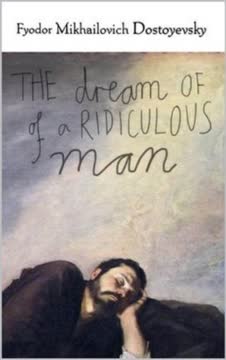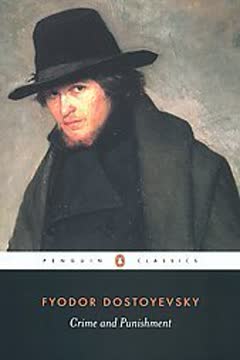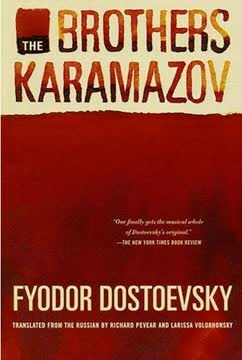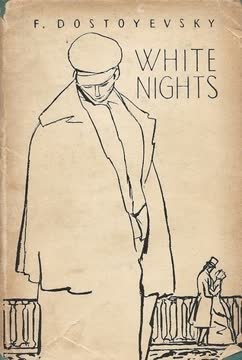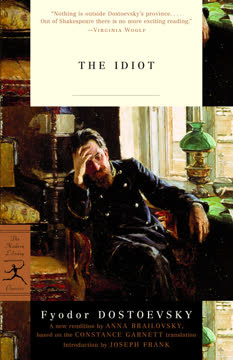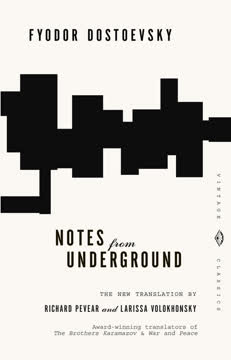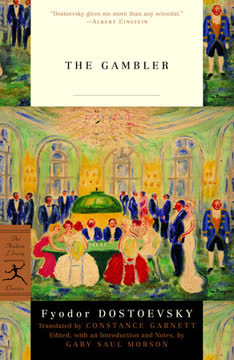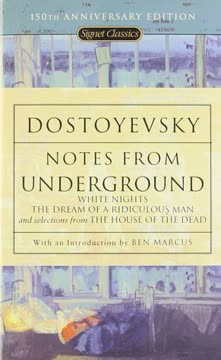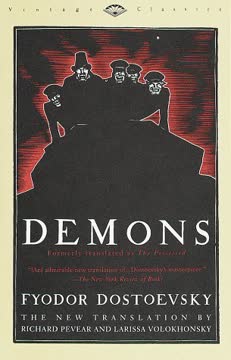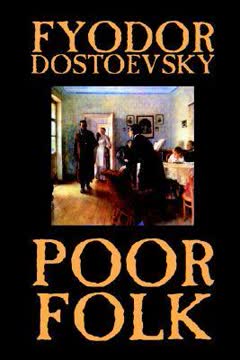Plot Summary
The Ridiculous Man's Revelation
The protagonist, a self-proclaimed ridiculous man, is consumed by the belief that nothing in the world matters. This conviction leads him to plan his own suicide, as he feels detached from life and indifferent to the world around him. However, a chance encounter with a desperate little girl seeking help for her dying mother stirs something within him. Despite his apathy, he feels a pang of pity, which confounds him, as he believes he should be beyond such emotions. This internal conflict delays his suicide, leading him to fall asleep and dream.
A Descent into Despair
In his dream, the man shoots himself and experiences a surreal journey through space. He finds himself in a coffin, aware of his surroundings but unable to move. As he drifts through the cosmos, he is accompanied by a mysterious being who guides him to a distant star, a duplicate of Earth. This journey symbolizes his descent into despair and the realization of his own insignificance in the universe.
The Dream of Truth
The man arrives on a new Earth, a paradise inhabited by sinless people living in harmony with nature. They are beautiful, innocent, and live without the need for science or complex knowledge. Their lives are filled with love, joy, and a deep connection to the world around them. The man is embraced by these people and experiences a profound sense of belonging and peace, unlike anything he has known before.
A World Without Sin
The inhabitants of this new Earth live in a state of bliss, free from the vices and conflicts that plague humanity. They have no concept of shame, jealousy, or deceit, and their society is built on mutual love and respect. The man is deeply moved by their way of life and begins to understand the true nature of happiness and fulfillment, which is rooted in simplicity and genuine human connection.
The Fall of Innocence
Despite the initial harmony, the man inadvertently introduces corruption to this idyllic world. The people begin to lie, experience jealousy, and engage in acts of cruelty. The once-perfect society falls into chaos, mirroring the flaws and sins of the man's original Earth. This fall from grace devastates the man, who realizes that he is responsible for their suffering and the loss of their innocence.
The Burden of Knowledge
The man awakens from his dream with a newfound understanding of the truth. He realizes that the dream was a reflection of his own inner turmoil and the potential for redemption through love and selflessness. The dream has shown him the possibility of a better world, but also the ease with which it can be destroyed by human folly. This knowledge becomes a burden, as he grapples with the implications of his actions and the nature of existence.
Redemption Through Love
Transformed by his dream, the man resolves to dedicate his life to preaching the truth he has discovered. He understands that love and compassion are the keys to creating a better world, and he is determined to share this message with others. Despite being ridiculed and dismissed as mad, he remains steadfast in his mission, driven by the hope that humanity can change and embrace a life of love and harmony.
Characters
The Ridiculous Man
The protagonist is a man who feels disconnected from the world, believing himself to be ridiculous and insignificant. His journey from despair to enlightenment is central to the narrative, as he grapples with existential questions and ultimately finds redemption through a dream that reveals the potential for a better world.
The Little Girl
The little girl represents innocence and vulnerability. Her desperate plea for help awakens a sense of compassion in the protagonist, setting off a chain of events that leads to his transformative dream. She symbolizes the impact of human connection and the power of empathy.
The Mysterious Being
This enigmatic figure accompanies the protagonist on his journey through space, leading him to the new Earth. The being represents the unknown and the possibility of otherworldly wisdom, serving as a catalyst for the protagonist's awakening to the truth.
The Inhabitants of the New Earth
These sinless people live in a state of bliss, free from the vices that plague humanity. They embody the ideal of a perfect society, living in harmony with nature and each other. Their eventual fall from grace highlights the fragility of innocence and the ease with which it can be corrupted.
Plot Devices
The Dream
The dream serves as the central plot device, providing the protagonist with a profound revelation about the nature of existence and the potential for a better world. It acts as a catalyst for his transformation, allowing him to confront his own flaws and the impact of his actions on others.
The Revolver
The revolver represents the protagonist's initial desire to escape the world through suicide. However, it also serves as a turning point, as the delay in using it leads to the dream that ultimately saves him. The revolver symbolizes both the end of one life and the beginning of another, marked by newfound purpose and understanding.
The Duplicate Earth
The new Earth in the dream is a reflection of what humanity could achieve if it embraced love and harmony. It serves as both a utopian vision and a cautionary tale, illustrating the ease with which innocence can be corrupted and the importance of striving for a better world.
Analysis
"The Dream of a Ridiculous Man" explores profound themes of existential despair, the search for meaning, and the transformative power of love. Dostoevsky uses the protagonist's journey to illustrate the potential for human redemption through compassion and selflessness. The dream serves as a vehicle for revealing the truth about the human condition, highlighting both the potential for a harmonious existence and the ease with which it can be destroyed by human folly. The narrative challenges readers to reflect on their own lives and the impact of their actions on the world, ultimately advocating for a life rooted in love and empathy.
Last updated:
FAQ
Synopsis & Basic Details
What is The Dream of a Ridiculous Man about?
- Apathy's existential crisis: The story follows a man consumed by an overwhelming sense of indifference to the world, leading him to decide on suicide. He believes nothing matters, and this conviction has alienated him from humanity and reality.
- A chance encounter's impact: On a particularly dismal night, as he walks home to end his life, he encounters a desperate little girl pleading for help. His unexpected pang of pity for her, despite his proclaimed apathy, sparks an internal conflict that delays his suicide.
- Truth revealed through dream: This internal struggle leads him to fall asleep, where he experiences a vivid, transformative dream. This dream takes him on a journey to a utopian Earth, where he witnesses both the purity of humanity and its subsequent corruption, ultimately revealing a profound truth about life and love.
Why should I read The Dream of a Ridiculous Man?
- Profound philosophical depth: The novella delves into fundamental questions of existence, morality, and human nature, exploring themes of nihilism, the Fall of Man, and the possibility of universal love. It offers a concise yet powerful exploration of Dostoevsky's core philosophical concerns.
- Intense psychological journey: Readers witness the protagonist's complete transformation from utter despair and solipsism to fervent hope and a mission to preach universal truth. It's a masterclass in psychological realism, despite its "fantastic" premise.
- Timeless message of redemption: Despite the bleakness of its initial premise, the story ultimately delivers a powerful message about the redemptive power of compassion and the inherent goodness that can exist in humanity, making it deeply resonant for those seeking meaning.
What is the background of The Dream of a Ridiculous Man?
- Part of Dostoevsky's 'Diary': The story first appeared in the April 1877 issue of Dostoevsky's Diary of a Writer, a unique publication where he explored contemporary issues, philosophical ideas, and published short fiction. This context highlights its role as a direct expression of his evolving thought.
- Reflects author's spiritual shift: Written after his Siberian exile, the novella embodies Dostoevsky's mature anti-utopian sentiment and devout Orthodox Christian beliefs. It critiques secular utopianism, arguing that true brotherhood and paradise cannot be achieved through human reason or political systems, but only through individual spiritual rebirth and love, as stated in the introduction: "Salvation was to be erected not on the basis of humanism or a transformed political order, but on the religious rebirth of the individual."
- Intertextual and artistic influences: The dream's Golden Age vision is directly inspired by Claude Lorrain's painting Acis and Galatea (which Dostoevsky called 'The Golden Age'), a motif also appearing in Devils and An Accidental Family. This connection grounds the "fantastic" element in a rich artistic and literary tradition.
What are the most memorable quotes in The Dream of a Ridiculous Man?
- "I am a ridiculous man. Nowadays they call me mad.": This opening line immediately establishes the protagonist's self-awareness and his alienated status, setting the tone for his existential crisis and the societal perception he grapples with. It encapsulates his initial despair and the ridicule he faces.
- "For once you have learned the truth and seen it, you know it really is the truth, that there is and can be no other, whether you are asleep or awake.": This quote, uttered after his transformative dream, powerfully asserts the absolute certainty of his newfound revelation, elevating the dream's experience to a higher form of reality and knowledge. It underscores the story's central theme of truth's undeniable power.
- "The chief thing is to love others as oneself, that's the main thing, and that's it—absolutely nothing more is necessary: you would immediately discover how to bring it about.": This concluding statement encapsulates the core message of the story, presenting a simple yet profound solution to humanity's woes. It highlights the transformative power of selfless love as the ultimate path to paradise on Earth, directly referencing Mark 12:31.
What writing style, narrative choices, and literary techniques does Fyodor Dostoevsky use?
- First-person confessional monologue: The story is told entirely from the protagonist's perspective, immersing the reader directly into his chaotic, stream-of-consciousness thoughts. This allows for deep psychological exploration, revealing his internal contradictions and emotional shifts, as seen in his initial musings: "I keep pacing about trying to make sense of all this. I've been trying to make sense of it for six hours now and I still can't get my thoughts into focus."
- "Fantastic realism": Dostoevsky labels the story "A Fantastic Story," not for its narrative form (as in A Gentle Creature), but for its utopian content, which he presents with a stark, almost journalistic realism. This blend of the fantastical and the mundane allows him to explore profound philosophical ideas within a believable psychological framework, making the dream feel intensely real to the protagonist.
- Symbolism and allegory: The narrative is rich with symbolic elements, such as the "tiny star" that prompts his suicide decision, the "duplicate Earth" representing humanity's potential, and the "trichina" symbolizing the germ of corruption. These symbols elevate the personal narrative to an allegorical exploration of the human condition and the Fall of Man.
Hidden Details & Subtle Connections
What are some minor details that add significant meaning?
- The "dismal" November 3rd: The specific date and description of the weather—"rain of the coldest and most cheerless kind, a sort of menacing rain, I remember, openly hostile towards human beings"—externalizes the protagonist's internal state of despair and indifference, creating a palpable atmosphere that mirrors his soul. This detail emphasizes the depth of his pre-dream nihilism.
- The captain's noisy neighbors: The constant "bedlam" and "free fight" from the captain's room, which the protagonist claims "never bothers me," subtly highlights his profound detachment from human suffering and chaos. His indifference to their "shouting" and "grumbling" underscores his self-imposed isolation and the extent of his apathy before his transformation.
- The "electricity of human thought": During his dream, the protagonist notes the "whirlwind of thoughts and sensations raced through my mind in that split second—thank God for the electricity of human thought!" This seemingly throwaway line emphasizes the extraordinary speed and complexity of the human mind, particularly in moments of crisis or revelation, suggesting that profound truths can be grasped instantaneously, even unconsciously.
What are some subtle foreshadowing and callbacks?
- The "sickly girl" metaphor: In the introduction to White Nights, Dostoevsky uses the metaphor of a "frail and sickly girl" who suddenly becomes "marvellously beautiful" in spring, only to revert to her former state. This subtly foreshadows the Ridiculous Man's own "sickly" spiritual state, his momentary glimpse of paradise, and the fragility of that ideal when confronted with human nature.
- The "star" as a guiding light: The "tiny star" that prompts the protagonist's suicide decision ("why the star had put the idea into my head, I don't know") is later revealed in his dream to be the "same star you saw between the clouds as you were returning home," which guides him to the utopian Earth. This transforms an initial symbol of despair into a beacon of hope and destiny, suggesting a preordained path to truth.
- The "mute contempt" and "pride": The protagonist's internal vow to feel "mute contempt" during his imagined martyrdom in the coffin echoes his earlier admission of "pride" that prevented him from admitting his ridiculousness. This callback highlights the deep-seated nature of his pride, which persists even in the face of death, and which he must overcome to truly embrace love.
What are some unexpected character connections?
- The Ridiculous Man and the Pawnbroker (from A Gentle Creature): Both characters are "dreamers" who have withdrawn from society and constructed elaborate internal systems to justify their alienation and pride. The Pawnbroker's "will to power" and "tyranny" over his wife, and his "sordid, blundering individual" self-assessment, parallel the Ridiculous Man's initial solipsism and his later realization of having "corrupted them all," suggesting a shared Dostoevskian archetype of the alienated intellectual.
- The Little Girl and Nastenka (from White Nights): Both young female figures serve as catalysts for the male protagonists' emotional awakening. The little girl's desperate plea awakens pity in the Ridiculous Man, just as Nastenka's vulnerability and "human sympathy" stir the Dreamer in White Nights. They represent innocent, suffering humanity that breaks through the protagonists' self-imposed isolation.
- The Mysterious Being and the "Goddess of Imagination": The "mysterious creature" who guides the Ridiculous Man through space can be seen as a more profound, perhaps divine, manifestation of the "Goddess of Imagination" mentioned in White Nights. While the latter leads to self-delusion, the former guides the Ridiculous Man to a genuine, albeit painful, truth, suggesting a higher purpose to imaginative experience.
Psychological, Emotional, & Relational Analysis
What are some unspoken motivations of the characters?
- The Ridiculous Man's desire for significance: Beneath his proclaimed indifference, the protagonist harbors a deep, unspoken desire for meaning and validation. His decision to commit suicide is not just apathy, but a desperate act to assert control and significance in a world he feels has none, as he muses: "the world was created for me alone, as it were: I will shoot myself and the world will cease to exist, at least for me."
- The little girl's desperate trust: Her persistent tugging and crying, despite being rebuffed, reveal an unspoken, primal trust in humanity's inherent goodness. Her motivation is pure survival and a child's desperate hope for help, which inadvertently challenges the protagonist's nihilistic worldview.
- The utopian people's inherent love: Their "blithe and childlike gaiety" and "mutual love affair, complete and universal" are not motivated by external laws or creeds, but by an intrinsic, unspoken understanding of interconnectedness. Their actions stem from a natural, uncorrupted state of being, where "life was complete in itself."
What psychological complexities do the characters exhibit?
- The paradox of indifference and pain: The Ridiculous Man's claim of absolute indifference is immediately contradicted by his physical and emotional reactions. He states, "If someone had struck me, I would have experienced pain," and then feels "pity" and "shame," demonstrating that his intellectual nihilism cannot fully suppress his innate human capacity for feeling.
- Pride as a barrier to connection: His "pride" is a central psychological barrier, preventing him from admitting his "ridiculousness" and seeking genuine connection. This pride leads him to self-imposed isolation and a distorted view of reality, where he believes "the world was created for me alone," until the dream shatters this solipsistic delusion.
- The "Fall" as psychological regression: The corruption of the utopian people mirrors a psychological regression, where innocence gives way to the complexities of human vice. Their development of "science," "justice," and "war" reflects the human mind's tendency to create elaborate systems and conflicts once it loses its original harmony and simplicity.
What are the major emotional turning points?
- The pang of pity for the little girl: This is the initial, crucial emotional turning point. Despite his resolve to die and his proclaimed indifference, the "strange aching feeling" of pity for the child ("I did pity her very much—to the point of experiencing a strange aching feeling, utterly incredible in the situation I was in") shatters his apathy and delays his suicide, opening the door for his transformative dream.
- The "irresistible, rapturous love" for Earth: During his cosmic journey, seeing his own Earth from afar ignites an "irresistible, rapturous love for that dear old former earth I had left behind." This intense emotional re-connection to his home planet, despite its suffering, marks a shift from detachment to profound affection, even for its imperfections.
- The "boundless rapture" of awakening: Upon waking from the dream, the protagonist experiences "Rapture, boundless rapture exalted my whole being." This overwhelming joy, coupled with tears, signifies his complete spiritual rebirth and the emotional conviction of the truth he has witnessed, transforming his despair into an urgent desire to preach.
How do relationship dynamics evolve?
- From isolation to universal connection: The protagonist's relationship with humanity evolves from complete alienation ("I had barely managed to make a single acquaintance") to a profound, universal love. His dream allows him to experience true brotherhood and then the pain of human corruption, leading him to embrace all people, even those who mock him: "I love those who mock me more than all the others."
- The shift from contempt to empathy: Initially, the Ridiculous Man views others with a detached, almost contemptuous indifference, as evidenced by his amusement at his friends' arguments and his harshness towards the little girl. His dream, however, forces him to confront the consequences of human folly, leading to a deep empathy and a desire to alleviate suffering.
- The preacher and the scoffers: Post-dream, his relationship with society transforms into that of a prophet and his disbelievers. He becomes a "preacher" of the truth, while others "laugh in my face" and call him "mad." This dynamic highlights the challenge of conveying profound spiritual truth to a world steeped in cynicism and rationalism.
Interpretation & Debate
Which parts of the story remain ambiguous or open-ended?
- The dream's literal reality: The protagonist himself debates whether his dream was "no dream at all!" or a "lofty delusion." While he asserts its truth ("For once you have learned the truth and seen it, you know it really is the truth"), the narrative leaves open whether it was a literal vision or a profound psychological experience, allowing readers to interpret its source.
- The mechanism of corruption: How exactly the protagonist "corrupted them all" remains somewhat ambiguous. He states, "I don't know, don't remember," implying it was a subtle, perhaps unconscious, process. This ambiguity suggests that corruption might be an inherent human tendency, easily triggered, rather than a deliberate act of malice on his part.
- The feasibility of "paradise" on Earth: While the protagonist believes "in one day, in one hour it could all be brought about," the story also shows the utopian world's rapid descent into vice. This leaves open the question of whether humanity is truly capable of sustaining such a paradise, or if the "old truth" of love will always fall on "stony ground."
What are some debatable, controversial scenes or moments in The Dream of a Ridiculous Man?
- The protagonist's initial cruelty to the little girl: His act of stamping his foot and shouting at the desperate child, despite feeling pity, is a controversial moment. He justifies it by his nihilistic philosophy ("if I commit some inhuman villainy, I can do that now, because in two hours' time, all will be extinguished"), forcing readers to confront the depths of his moral indifference before his transformation.
- The "corruption" of the innocent people: The idea that a single individual could corrupt an entire sinless society is a provocative concept. It raises questions about the fragility of innocence and whether evil is an external contagion or an inherent, dormant potential within humanity, waiting to be awakened.
- The rejection of suffering in paradise: The utopian people live without "grief or tears," experiencing only "serene, fulfilled, contemplative ecstasy." This contrasts sharply with Dostoevsky's broader philosophy, often suggesting that suffering is necessary for spiritual growth and the attainment of truth, as the protagonist later states: "On our earth we can only truly love suffering, or through it! We know no other way to love and know no other kind of love. I seek to suffer in order to love."
The Dream of a Ridiculous Man Ending Explained: How It Ends & What It Means
- A spiritual rebirth and mission: The story concludes with the protagonist awakening from his dream, completely transformed. He rejects suicide, embraces life, and resolves to dedicate himself to preaching the "Truth" he has seen: "Yes, life—and preaching! That very moment, I resolved upon preaching, naturally for the whole of my life!" This signifies a profound spiritual rebirth, moving from nihilistic despair to fervent, active love.
- The "old truth" of universal love: The core meaning of the ending lies in the protagonist's realization that "The chief thing is to love others as oneself, that's the main thing, and that's it—absolutely nothing more is necessary." This simple, ancient truth, often overlooked, is presented as the sole path to creating paradise on Earth, emphasizing the power of individual moral transformation over external systems.
- Enduring hope despite ridicule: Despite being mocked and called "mad" for his beliefs, the protagonist remains steadfast in his mission. His final act of tracking down the little girl he wronged ("And I have tracked down that little girl … and I will go! I will!") symbolizes his commitment to active, compassionate love in the real world, demonstrating that true redemption involves concrete action and a willingness to face the world's cynicism.
Review Summary
"The Dream of a Ridiculous Man" is a profound philosophical short story exploring themes of nihilism, suicide, and redemption. Readers praise Dostoevsky's ability to delve into human psychology and existential questions in a compact narrative. The protagonist's journey from despair to enlightenment through a transformative dream resonates with many. While some find the utopian vision overly idealistic, most appreciate the story's depth and Dostoevsky's masterful storytelling. The work is seen as a distillation of the author's key themes and a powerful reflection on human nature and society.
Download PDF
Download EPUB
.epub digital book format is ideal for reading ebooks on phones, tablets, and e-readers.
